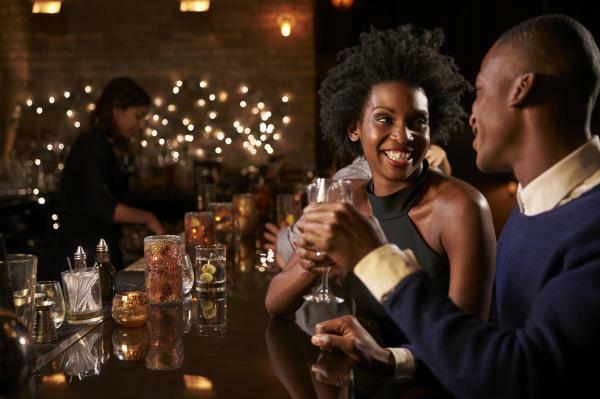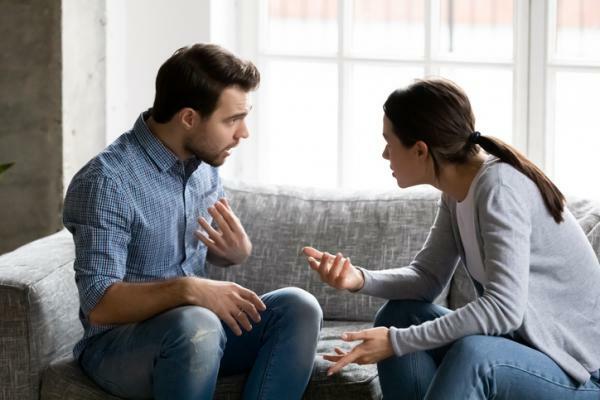
The human being is a gregarious animal, You need to interact with others and with your environment.
Within interpersonal relationships, we can open a separate section to couple relationships. We meet on numerous occasions in the consultation, people affected psychologically by a break, because they are unable to find stability in their relationships, because they get hooked on their partners creating addictive relationship models, because they are unable to start a relationship because of the fear that this generates... Next, in this PsychologyOnline article, we will present from a psychological perspective, couple conflicts.
Index
- Factors and variables in couple conflicts
- Variables that influence love relationships:
- Couple conflicts
- Communication
- Leisure and free time
- Expectations, beliefs about the relationship and the way to interpret the other as triggers of the conflict
- Infidelity
- Jealousy
- Dependent relationships
Factors and variables in couple conflicts.
In our interpersonal relationships, our past and present experiences influence. Consequently, we perceive new events in the same way as old ones: if I have failed in most of my relationships, if I have hooked on my partners and annulled myself As a person, if I have constant conflicts in my relationship... in these cases, when faced with a similar situation, the same fears will appear again. previous.
There are different variables that affect us both for the choice of the partner, and for the coping with the problems that are generated from it.
Sometimes, this information that determines the relationships that a person may have and the way they cope with conflicts, go completely unnoticed. The first step in effectively resolving a conflict situation is to know each factor and realize to what extent it can influence the relationship.Knowledge is the first step for change and conflict resolution.
Variables that influence love relationships:
Felix Lopez Sanchez tells us about the components of a love relationship
Wish:
It is perceived as the need to seek sexual satisfaction, sexual fantasies, desire to hug and caress, desire to be hugged and caressed ...
Attraction:
The attraction supposes the desire but oriented basically towards the object of the desire. It implies that some person or specific stimulus (real or fantasized) has "erotic value"
Infatuation:
It is about the sum of desire and attraction. Falling in love, although it is lived and felt as a unique and individual experience, is expressed in perceptions, feelings, fantasies and behaviors, which are often very similar in different people in love, even though there are also great differences individual.
Among other variables that influence couple relationships, it is necessary to talk about self-image or what is the same, the concept we have of ourselves:
When a person does not support himself, he may seek to be supported by the other, thus using him as the only point of support in her life. Without him he would fall, for which reason he needs him for his daily "survival", thus generating pathological or addictive relationships.
Likewise, if our self-image is low, our ability to initiate relationships is diminished, producing us fear and insecurity. Regarding relationships that are already consolidated but that may have conflicts of communication, leisure, passion..., self-image It is also related in the sense that if we do not see ourselves as acceptable as people, we can hardly add strength to our relationship.
The importance of ATTACHMENT
Shaver and Hazan (1987) consider that "the love process can be understood from the attachment patterns that are formed in childhood and are maintained throughout the life cycle."
The attachment history and style are related to the love experience that adults have in this sense: more positive love experience for people who have a more positive attachment history and attachment style insurance.
Attachment is a relatively stable relational pattern that ends up conforming to one of these 3 fundamental types:
- SECURE ATTACHMENT: is associated with trusting and positive relationships. With more prior autonomy, better partner selection, more realistic and favorable ideas about love, easier intimacy and commitment, more satisfaction in the bond, better breakup.
- ANXIOUS ATTACHMENT: is associated with dependent relationships and a continuing need for confirmation that one is loved, difficulties for autonomy, search and hasty selection, fear of not being loved, fear of loss and frequent jealousy, contradictory ideas about love, difficulty in to break.
- AVOIDABLE ATTACHMENT: it is associated with distrustful and distant relationships. With pseudo emotional autonomy, fear of intimacy, difficulty in establishing relationships, relationships with little intimacy, Difficulty with affective manifestations, pessimistic ideas about love, apparent easy breakup, insecurity camouflaged.

Couple conflicts.
Appear when in the 2 limbs there are two motivations foropposite character but of equal intensity. They are the basis of misunderstandings of the couple's relationship and are by far the cause of dissatisfaction, frustration and weakness and even loss of the couple if they are not well resolved.
There are some areas of conflict that appear more constantly, such as the division of tasks of home, which provoke arguments and unpleasant situations but which generally do not give rise to breaking off.
There are other sources of conflict that are based on deeper aspects of the couple and it is these that can generate more serious problems. These derive from the disagreement in the way of perceiving intimacy, the degree of commitment and passion.
Maintaining satisfaction in the relationship requires a great effort on both sides as well as the use of certain skills that help it to function properly (communication, respect, complicity, passion ...).
Communication.
It is almost unnecessary to mention that good communication is the foundation of a successful relationship. Communication is not always verbal since the couple also looks at each other, touches each other, smiles (non-verbal communication).
Faced with a situation in which we want to communicate something, the way or form of emitting it, how the other receives it and the content of this message are fundamental. Thus, we find different ways of communicating and some of them they are not exactly positive.
"Coercion”: It is a form of communication where only our own needs are taken into account by making the other very difficult life in the sense that their needs are not taken into account and trying to get the submission or cancellation of the other.
This is so because the partner who gives in does so not because he considers the other to be right but to avoid discussion and threats. In conclusion: to escape a conflict.
"Negative emotional responses": “Are those words, gestures, actions, etc., that are experienced as unpleasant: shouts, threats, humiliations, sarcasms... and that on numerous occasions is what fundamentally holds together a partner
Between the positive ways or ways of communicating we meet according to Liberman:
- Verbal expressions: compliments, compliments, affectionate words, compliments ...
- Affective behaviors: caress, hold hands, touch the cheek ...
- Actions that make life for your partner easier or more pleasant: try not to make noise, wake him up, prepare a meal that he likes, give a gift ...
Leisure and free time.
One of the most frequent conflicts in couple relationships is different perspective of both members to organize their free time and social activities.
It could be that they both got carried away by the daily routine, embargoed by their respective jobs and daily chores and who have forgotten how to have fun. Or because each one seeks their own fun independently of their partner and / or the other way around: they spend their lives together and do not relate to anyone else. It also usually happens in young couples that when having a child, the point of view on how to organize social activities is different, since a member of the The partner may want to focus solely on caring for the child (leaving the social area aside) and the other demands trying to plan a couple's own time.
Be that as it may, the person as an independent individual has their own needs and it is difficult to adapt and combine them with your partner. For example: if I have the need to stay home on weekends because I really feel like it and I enjoy it, this does not cause me any problems, indeed, it makes me happy. But as an independent person. Now, if I maintain a relationship where the other needs and enjoy going out on weekends and I don't feel like it, a conflict of interest appears.
The way to solve this conflict and the importance or relevance that the couple gives it, will depend on the emotional resources, communication, empathy… Of each of the members

Expectations, beliefs about the relationship and the way to interpret the other as triggers of the conflict.
The ideas that each member of the couple has in reference to their life together, to their coexistence, to their future prospects... sometimes they are a point of conflict since it may happen that the 2 members of the couple do not see it in the same way.
However, all this refers to the ideas that each member has about what her relationship should be for it to be totally satisfactory. "What it should be and what it really is", being the source of numerous conflicts in the case in which the members do not perceive it in the same way. We will refer above all to how each member of the couple can interpret the problems that occur to them.
Interpretations of these motifs are what we call attributions. When your partner, for example, does not clear the table after eating, you may think that: he / she is a selfish person who always thinks of himself / herself and never takes you into account …… .If you change this approach and you think that it is not that it is selfish but that at home nobody taught him and it really is a lack of "learning"..., the reaction that one has towards the other is completely different.
Infidelity.
In a relationship, not only internal factors influence it (communication skills, future expectations, commitment ...), there are also factors external factors that directly influence it: work and personal stress of each of the members, routine, problems related to the environment such as family and friends ...
In these moments where the relationship could be lower on an emotional level, due to this series of external and internal conflicts of the couple itself it is when the couple is most vulnerable (more likely that negative things will happen).
It is this vulnerability that can trigger another person to enter the relationship and infidelity then appears.

Jealousy.
The pathological jealousy they are accompanied by intense feelings of insecurity, self-pity, hostility, and depression and are often destructive to the relationship.
In the case of jealousy, there is a lot to do with self-esteem. If I look strong and confident and I have a high self-esteem, I will not depend on my partner being with me always to feel good since I support myself alone, I am full of many other things, however, if my Improve your relationship with a partner is low, I feel insecure and the only The way to fill me with security is that my partner is only with me, I will choose to pressure her and depend on this exclusivity to feel full.
Jealousy are based on irrational beliefs: If I think "my partner can never leave me because he knows that if he does, it will cause me a lot of pain, therefore, I would be a bad person", I am using an irrational thought.
Dependent relationships.
In a situation of a couple relationship, a conflict (problem) can occur, which causes the members of the couple to make 2 decisions: or work together to fix it or break the relationship (Sometimes it is a single member of the couple who makes the decision to leave him).
But it may happen that one of the partners chooses to deny the evidence of this conflict, or constantly blames himself whenever there is a problem. If this situation of self-incrimination is perpetuated, then an inequality of roles in the relationship occurs, where one has more power than the other. The one who has less power, remains hooked on the other, thus producing an addictive relationship since he "needs the other" in a sickly way and is capable of annulling himself and denying evidence just by being with he.
The end result is that the dependent's personality is annulled in that of the dominant, who may or may not be aware of what he is doing.
Among the dependent relationships we find:
- LOVE ADDICTION:Pia Mellody tells us about this disease, which consists of those affected allocating a disproportionate time to their relationship and a value above themselves to the person they are addicted to, sometimes in a way that obsessive. They hold unrealistic expectations regarding positive and unconditional regard for the person they are hooked on. They are neglected and undervalued while in the relationship.
- EMOTIONAL DEPENDENCE: Jorge Castelló He defines it as "a pattern of unsatisfied emotional needs since childhood, and that now as adults, we seek to satisfy through the search for very close interpersonal relationships." It is a maladaptive disorder that only occurs with the subject on whom it depends, which is why it is less generalized than the previous one, although no less serious for that.
- CODEPENDENCE: Sirvent, He defines it as the special relationship established between a person who lives with a drug addict (usually an alcoholic but it can also be other drugs). These people overprotect and justify all the behaviors of the addict, no matter how aberrant they may be.
- BIDEPENDENCE: According Mª Cruz Ribas Reguero, is “the set of attitudes, behaviors and affections that affect a person who is dependent on a drug and on another person at the same time.
This article is merely informative, in Psychology-Online we do not have the power to make a diagnosis or recommend a treatment. We invite you to go to a psychologist to treat your particular case.
If you want to read more articles similar to Couple conflicts, we recommend that you enter our category of Couple therapy.


